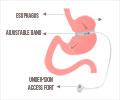Bariatric surgery done for weight loss and is known to reduce the risk of diabetes is now linked to reduce the risk of cancers.

‘The risk of postmenopausal breast cancer, endometrial cancer, pancreatic cancer and colon cancer reduced in obese patients who underwent bariatric surgery.’





The study reviewed medical data of 22,198 individuals who had bariatric surgery and 66,427 nonsurgical patients between 2005 and 2012 with follow-up through 2014. More than 80 percent of patients in the study were women. Patients undergoing bariatric surgery had a 33 percent lower risk of developing any cancer during follow-up, according to the published findings. Schauer says the benefit is greatest among obesity-associated cancers.
- The risk of postmenopausal breast cancer dropped by 42 percent
- The risk for endometrial cancer dropped 50% in severely obese patients.
- The risk of colon cancer dropped 41%
- The risk of pancreatic cancer was lowered by 54%
Cancer risks for postmenopausal breast cancer and endometrial cancer are closely related to estrogen levels. Having weight loss surgery reduces estrogen level.
Bariatric surgery helps reduce the risk of diabetes and insulin levels which may be a risk factor for pancreatic cancer, while the mechanisms for colon cancer are more complicated.
Advertisement
The study found no significant association between bariatric surgery and cancer risk among men. Schauer says that may be because the vast majority of study patients are female and at least two of the cancers most impacted by bariatric surgery, postmenopausal breast cancer and endometrial cancer, affect women only.
Advertisement










